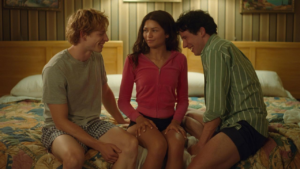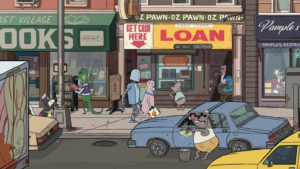Reviewed by GREG KING
Director:Mohsen Makhmalbaf
Stars: Shaghayeh Djodat, Abbas Sayah, Hossein Moharami, Rogheih Moharami
Running time: 74 minutes.
The latest film to emerge from the gradually burgeoning film making culture of Iran is the visually stunning and lyrically beautiful Gabbeh. Like the recent The White Balloon, Gabbeh initially seems a deceptively simple story, but it reveals much about the nature of contemporary Iranian society for those who care to look further beneath the glossy surface. The story of a young woman’s desperate attempt to find love and happiness in a brutally patriarchal society, Gabbeh is sheer cinematic poetry, full of rich images, breathtaking landscapes, evocative traditional music, and glorious explosions of vibrant colours.
The gabbeh of the title are the finely woven and brightly coloured Persian rugs that depict simple stories inspired by the eternal cycle of birth, death and marriage. The colourful images trace the rich tapestry of life and are often based on the experiences of the nomadic weavers themselves. The film actually began as a documentary on the life of a nomadic tribe of gabbeh weavers moving through the inhospitable, rugged and remote areas of southern Iran, but veteran Iranian director Mohsen Makhmalbaf (the highly acclaimed Salaam Cinema, etc) changed direction and eventually treated the material as fiction.
Thus, the film opens with an elderly couple briefly stopping by a small pond, enabling the woman to wash her precious gabbeh. As the elderly woman washes the rug, a beautiful young woman named Gabbeh (Shaghayeh Djodat) mysteriously appears, and tells her story, which is ultimately revealed to be the one depicted on the rug. Scenes of the tribal women gathering and dying the necessary material and weaving their intricately patterned and brightly coloured gabbeh are intercut with Gabbeh’s heart breaking personal story and her desperate plea to be permitted her own chance to find love and happiness.
Gabbeh wants to marry her suitor, the mysterious horseman that follows her nomadic family, but is prevented from doing so by her domineering father and ever watchful family until a number of other significant events have transpired. First, her elderly school teacher uncle Sayahi (Abbas Sayah) has to marry, then her mother has to give birth to yet another child, and the family has to travel a certain distance on their journey. Gabbeh grows frustrated with the incessant delays, and the film vividly explores the often unhappy path to romance and the hardships of family life in this deeply religious, old fashioned and predominantly patriarchal society.
Cinematographer Mahmoud Kalari, a long time collaborator of Makhmalbaf’s, knows instinctively what the director is trying to achieve visually with his films, and he brings colour and life to Gabbeh. The lyrically beautiful story unfolds with economical precision, although there are some unnecessary moments of pure self-indulgence and artistic pretension from Makhmalbaf. But while the gorgeous looking film is a ravishingly visual feast for the eyes, Gabbeh eventually fails to satisfactorily engage audiences on an emotional level. The pacing is somewhat slow and deliberately measured, and Makhmalbaf’s style a little dry and distant.
★★★




